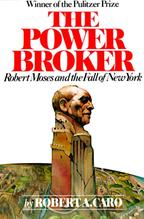 Robert Moses (1888-1981) was one of the most powerful men in 20th-century New York. He was a "master builder" of the Metropolitan Area, spearheading billions of dollars in major infrastructure projects that transformed transportation in and around the city. At the height of his power, Moses simultaneously held 12 titles, including NYC Parks Commissioner--none of which were elected positions. He wielded enormous influence over city and state elected officials, and could bypass legislative bodies for funding by issuing bonds or using the millions of dollars generated through his public authority tolls. Moses's many successful projects came at the cost of mass displacements of people and the destruction of whole neighborhoods. Public backlash, political pressure and activists like Jane Jacobs eventually undermined Moses's power.
Robert Moses (1888-1981) was one of the most powerful men in 20th-century New York. He was a "master builder" of the Metropolitan Area, spearheading billions of dollars in major infrastructure projects that transformed transportation in and around the city. At the height of his power, Moses simultaneously held 12 titles, including NYC Parks Commissioner--none of which were elected positions. He wielded enormous influence over city and state elected officials, and could bypass legislative bodies for funding by issuing bonds or using the millions of dollars generated through his public authority tolls. Moses's many successful projects came at the cost of mass displacements of people and the destruction of whole neighborhoods. Public backlash, political pressure and activists like Jane Jacobs eventually undermined Moses's power.
Perhaps the biggest blow to Moses and his legacy was delivered by Robert Caro's biography The Power Broker: Robert Moses and the Fall of New York (1974). Caro's 1,336-page colossus of original research, biographical information and wider history of New York City won a Pulitzer Prize in 1975. It depicts Moses first as a young idealist, whose projects like the creation of Jones Beach and the New York State Parks system gave way to a love of power for power's sake, transforming Moses into a man who ran 13 expressways across the city with little regard for public opinion and made a concerted effort to keep black war veterans out of Stuyvesant Town. The Power Broker is a classic work of urban planning and political power. --Tobias Mutter

